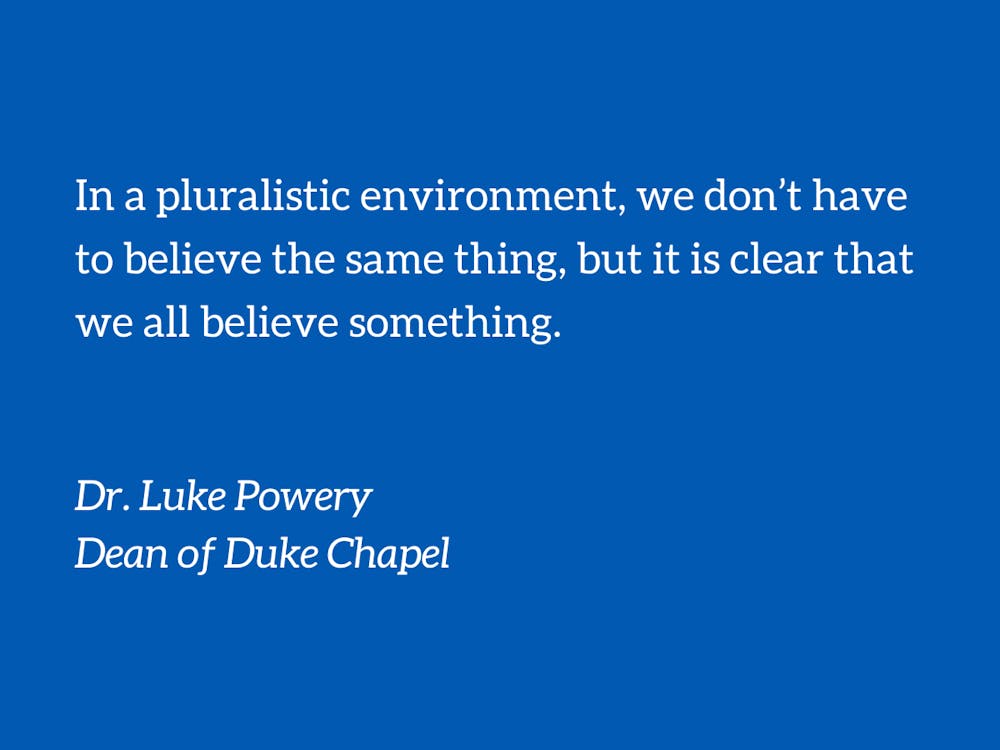During this year of celebration of Duke’s Centennial, believe it or not, I have become inspired by the Bylaws of Duke University. Like many universities, Duke has religious roots, which is not necessarily surprising for those who know the history of Christianity and higher education across the world. This is reflected in Article I of the bylaws, which says at its founding the University’s purposes were grounded "in the Christian tradition of intellectual inquiry and service to the world." This section on the "aims" of the university further notes "the diverse constituency that has developed since its founding." In explaining how its origins and current situation coalesce, the aims go on to say, "The University is committed to creating a rigorous scholarly community characterized by generous hospitality toward diverse religious and cultural traditions."
These aims related to faith and diversity reflect who Duke strives to be. They are in the DNA of the institution and continue to manifest at Duke. It is an institution with an aim (also in the bylaws) of "foster[ing] a lively relationship between knowledge and faith" and also "promot[ing] a respectful spirit of dialogue and understanding." One research paper summarized Duke’s approach to religious life on campus this way: "Thoughtful educators have long wrestled to strike an optimal balance between preserving the best of a common religious heritage, protecting intellectual freedom, and maximizing inclusivity in light of their present circumstances and perspectives."
One of the ways you can see this approach at work on campus today is during the Centennial event called "We Believe," a multi-faith, two-day engagement with Duke’s various faith communities, which began yesterday (Nov. 17) and continues throughout today. This event will lead you into the heart of Duke’s "diverse religious and cultural traditions." Through joyful experiences, thought-provoking conversations, and moments of quiet reflection, this event invites all to connect with Duke's vibrant faith communities.
You will have the opportunity to explore themes of Feasting and Fasting, Gathering and Departing and Sound and Silence — each inspired by practices from Duke's diverse religious traditions. With a Commonplace Book and Passport in hand, you’ll travel to various locations on campus, collecting stamps, recording reflections and engaging in meaningful encounters. From singing, listening, walking and praying to learning about food and farming, engaging a Sikh speaker, attending Catholic Mass, meeting a Muslim Chaplain, attending Hindu worship or Anglican-Episcopal morning prayer or Buddhist meditation, participants will taste and see the multiplicity of religious expression on campus.
It will reveal the present religious pluralism that is at Duke University. No single religious or cultural tradition is identical, so particularity makes up the plurality. To be plural does not mean uniform. It means differentiation but that doesn’t mean difference has to be demonized. That isn’t the Duke way. Difference or diversity, even religiously or faith-wise, is embraced as a reality of the world of which Duke is a part.
“We Believe” celebrates 100 years of diverse religious expression on campus and demonstrates that it is possible — to quote the bylaw’s aims one more time — "to promote a respectful spirit of dialogue and understanding; to discourage all partisan and sectarian strife.” The array of religious traditions reflects the university’s historic motto — "Eruditio et Religio" or Knowledge and Religion—in our time and the importance of faith and spirituality in the lives of students in particular, but most certainly among faculty, staff, administrators and alumni as well. In a pluralistic environment, we don’t have to believe the same thing, but it is clear that we all believe something.
The Rev. Dr. Luke A. Powery is Dean of Duke University Chapel. His column runs on alternate Mondays.
Get The Chronicle straight to your inbox
Sign up for our weekly newsletter. Cancel at any time.

